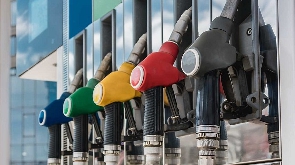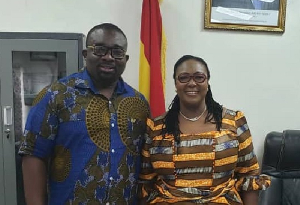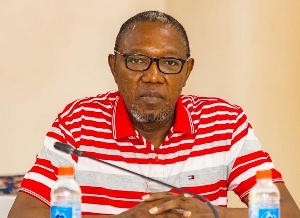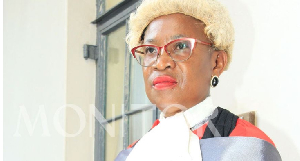Opinions of Thursday, 20 July 2023
Columnist: Ajoa Yeboah-Afari
Of a Kumasi GOIL station attendant’s midnight ‘shocker’
It was shortly after midnight, the start of Friday, July 14, 2023, when a VIP bus, a Dormaa-Ahenkro to Accra night service, stopped at a location in Kumasi. Avoiding the city centre, the driver was taking a shortcut to join the Kumasi-Accra highway and a passenger had told him that he needed to urinate.
I happened to be one of the passengers in the bus and I was relieved to see that the driver had thoughtfully taken us to a petrol station, specifically a GOIL station. He had decided that would be more convenient than a roadside stoppage, as fuel stations have washrooms.
My relief was because I thought there was bound to be a washroom there and therefore I, too, could make use of the opportunity to use it.
So, as happens in such cases, it wasn’t only the man who had made the request to the driver who got down; a few others too got down, including me.
I walked into the yard, past a section fenced off with construction tape, towards an open door of what looked like an office. A young woman seated there, obviously an attendant, was engaged on a mobile phone. I went to the doorway, greeted her and asked if we could use their washroom, fully expecting a positive response. But I was in for a shock.
Barely looking up from her phone, I had to repeat my enquiry before she replied that there was no washroom there! Even as I stood there perplexed, she was back on her phone. When I reminded her that petrol stations are supposed to have a washroom/toilet, she was adamant: no washroom there!
Having gathered what the attendant had said, as if by consensus, the other passengers all headed for the nearest convenient spot on the premises to relieve themselves. Thus, ironically, they had no alternative but to resort to the ‘open urination’ that the prudent driver had clearly sought to avoid.
Meanwhile, the attendant continued her concentration on her phone. Evidently, she wasn’t interested in how the passengers resolved their problem.
Incidentally, where she was sitting was opposite the VIP bus, so I found it strange that when she looked up and saw somebody approaching, she didn’t get up to meet the stranger. I thought the normal thing would have been to get up and find out what the visitor wanted. But she continued on her phone until I reached the doorway and posed my enquiry.
When I asked the driver for the name of the location of that fuel station, he told me it was an area known as ‘Labour’. (I understand there’s a Labour Office nearby.)
As we continued our journey, the ‘no washroom’ incident at the GOIL Company Limited, Labour station, was the topic for discussion. Some were of the view that the attendant had lied and that she had given that response because the driver had not bought petrol at that station. But even if that were true, I wondered how the attendant would know that the VIP company doesn’t buy fuel from other GOIL stations.
But other passengers agreed with me and the driver, that there was no requirement to buy fuel at a station before being allowed to use their conveniences.
Anyhow, a Kumasi resident has confirmed to me that the Labour GOIL does have a washroom and he has used it before.
My enquiries also confirmed that the supervisory body, the National Petroleum Authority (NPA) even requires all petrol stations to have washrooms/toilets before they are given the licence to operate.
Not only that, the facilities are not to be restricted to a station’s customers. The NPA’s Consumer Services Manager, Mrs Eunice Budu Nyarko, explained to me: “Washrooms at the various retail outlets are to be accessible to all, whether you drive in to purchase fuel or not.”
Furthermore, the General Manager of VIP JEOUN Transport, Mr Frimpong Manso, told me: “It’s unfair that the passengers were denied usage of the washroom. Again, it’s a public place and under the licensing regime of the NPA, so it’s an offence not to have a washroom, let alone to deny its usage.”
So then what could have been the reason for the attendant’s totally inconsiderate attitude? An issue of untrained staff members? Or an issue of a mean-spirited or spiteful individual?
If either, or both of the above apply, I wonder how a GOIL employee has such an attitude when by all indications, the company takes its social responsibility and image extremely seriously.
For example, just a couple of weeks ago, GOIL was in the news for donating free branded umbrellas to customers in parts of Accra, ahead of the rainy season! What a creative, customer-friendly gesture!
On its website, the company stresses that its Corporate Social Responsibility (CSR) is “committed to managing its operations in a manner that positively impacts the lives of the people; and a strategy “anchored” on three of the Sustainable Development Goals, including Sanitation.
What is the use of the fine declarations and aspirations on paper if some of the staff are not fully aware of them, or refuse to implement the values and CSR spirit of the company?
For the record, the senior representatives of both the NPA and the VIP JEOUN Transport have apologised for the inconvenience the passengers suffered, and I’m truly appreciative of that. But of course, they are not to blame.
Nevertheless, they have, respectively, indicated their intention to take the matter up.
Anyway, to me, the distressing occurrence also revives a subject some of us have been canvassing for ages: the urgent need for rest stops along Ghana’s highways.
While we await the construction of highway rest stops, as has been promised by Minister for Roads and Highways Mr. Kwasi Amoako-Attah, the travelling public, especially, should be able to count on petrol stations to assist; and that alternative needs to be widely publicised.
However, obviously, all petrol station staff, too, should be trained to know about that mandatory service to the public, as well as their own personal role when required.
Entertainment












